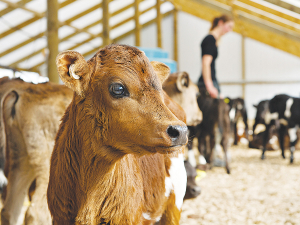Calf rearing facilities should be set up and maintained well to ensure calves stay healthy.
Young calves should be housed for at least 4 weeks to ensure they stay warm and are using their energy for growth.
Housing
- Must be dry and draught free for calves to regulate body temperature. Calves should be protected from wind and rain in a structure twice as long as wide.
- Cover the floor surface with dry materials such as sawdust, shavings, straw, post peelings or wood chip to a depth of at least 200-300mm. Avoid dusty materials. Ideally the floor should be lower at the front to help drain effluent and water. Regularly much out and top up the bedding so it is clean and dry.
- Good ventilation is essential and is best situated where the walls meet the ceiling. It’s easier to ventilate across the shed, not down the length. Ventilation should be adaptable, so the use of boards, shutters or wind cloth is recommended.
Spring Calves
- Calves are less stressed and have higher intakes in smaller groups. The shelter should provide a minimum of 1.5m2 per calf and, where possible, minimise calf contact between pens. The best approach is 10-20 calves per pen.
- Depending on how many calves you are rearing, having more than one shed separated into pens allows for easier separation of age groups and feeding levels. Having more pens also provides a safety barrier between calves in case of disease outbreak and will allow a pen/shed to be rested for cleaning and sanitation between different batches of calves.
Feeding Facilities
- Each pen must have clean, quality water, which should be checked, cleaned and refreshed daily. In hot conditions, restricted feeding systems, high meal/ fibre intakes or scours, an additional 2-6L of water per calf per day is required.
- Meal troughs should have sufficient space for feeding at least half of the calves at the trough at any one time. Provide a minimum of 300mm of trough space per calf.
- Keep meal feeders free from moisture and clean weekly to avoid fungal growth
- Keep milk lines as short as possible and ensure there is no stale milk left in hoses between feeds.
Cleaning
- Ensure all feeding equipment is regularly cleaned and treated with disinfectant. Bottles or cafeterias should be cleaned between feeds and automatic feeders (mixing bowls, lines and teats) should be cleaned and calibrated at least weekly.
- Use a broom to remove any excess material in laneways. Do not use a high-pressure hose inside the shed, as this will aerosol bacteria and viruses to calves in other pens.
- Spray the rearing area, feeding utensils and teats with approved virucidal at least once a week and daily during a disease outbreak
- Rodents and birds must be controlled.
- Isolate sick calves to reduce risk of spreading disease.
Article - NZ Agbiz Calf Rearing Guide


















